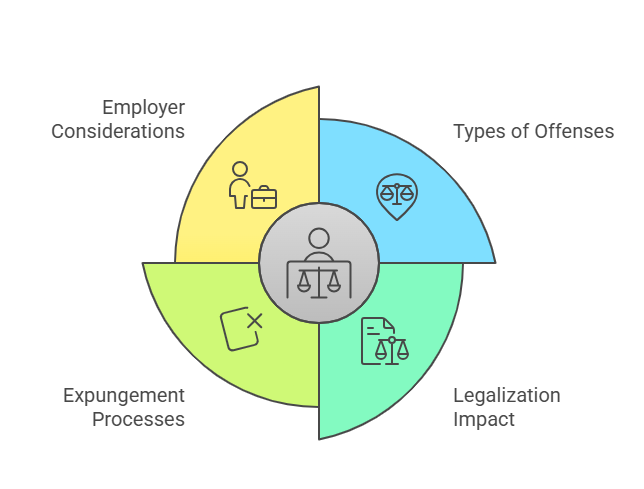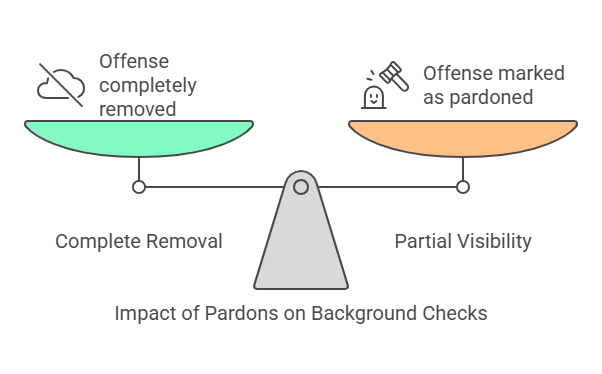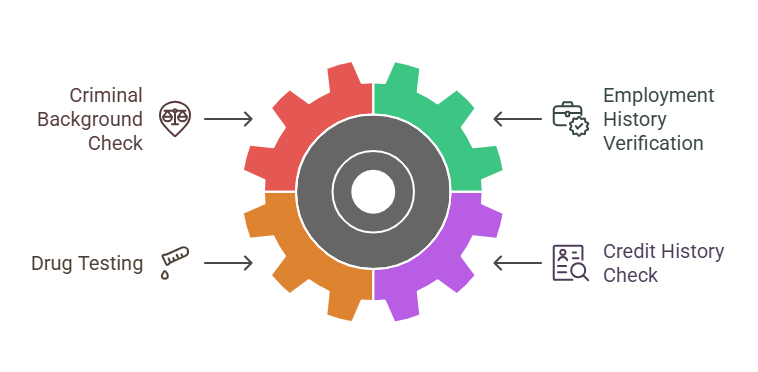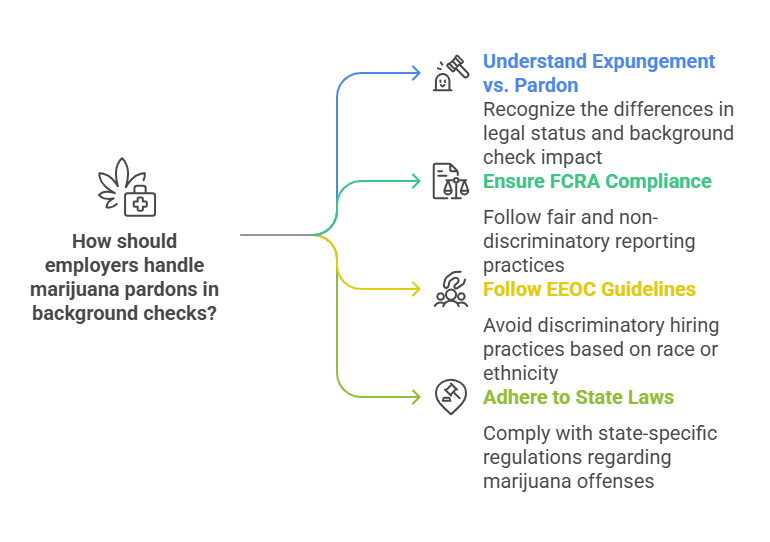How Marijuana Pardons Affect Employee Background Checks
Background checks are a critical component of the hiring process for employers across various industries. They provide valuable insights into an applicant’s history, which helps verify qualifications, safeguard the workplace, and mitigate risks. For businesses looking to ensure they hire qualified and trustworthy individuals, conducting a thorough background check is a key step. These checks encompass a range of criteria such as criminal history, employment verification, educational qualifications, and drug testing.
By evaluating a candidate’s background, employers can determine whether they are suitable for a role, especially in positions where trust and safety are paramount. As societal attitudes shift, one area that has seen increasing significance is how marijuana-related offenses are treated in background checks. Understanding how marijuana pardons affect these background checks is essential for both employers and job seekers, particularly as marijuana legalization spreads across various states.
Marijuana-Related Offenses in Background Checks
Marijuana-related offenses appear in background checks as part of the criminal history section. These offenses can range from misdemeanor charges related to possession or use to felony offenses such as trafficking or distribution. Historically, such offenses may have had significant repercussions on an individual’s ability to secure employment, especially in industries that require stringent background checks, such as healthcare, transportation, and government positions.

However, as marijuana legalization becomes more widespread across the U.S., more states are allowing for the expungement of marijuana-related offenses. In some cases, these offenses are no longer considered criminal, but instead, they may appear as dismissed charges or pardoned offenses in background check reports. This change has raised important questions for employers, including how to handle marijuana offenses that have been pardoned and whether these offenses should continue to be a barrier to employment.
Understanding Marijuana Pardons and Their Impact on Background Checks
A marijuana pardon is a legal decision that removes the consequences of a criminal conviction related to marijuana use or possession. In states where marijuana has been decriminalized or legalized, pardons or expungements allow individuals to have their criminal records cleared or updated, thus preventing employers from seeing these offenses in background check results. These legal actions are particularly important for individuals who have been convicted for minor marijuana offenses, as they may otherwise face difficulties in securing a job due to outdated criminal records.
The effect of marijuana pardons on background checks varies depending on the jurisdiction and the employer’s policies. In some states, pardons result in the complete removal of marijuana offenses from criminal records, meaning these offenses will not show up during background screening. However, in states where expungement or sealing does not completely erase the record, employers may still see a record of the offense, but it will be marked as “pardoned” or “expunged.”

Employers are increasingly being encouraged to adopt policies that recognize the evolving landscape of marijuana laws and the effect of pardons on hiring practices. While many businesses maintain strict drug-free workplace policies, it is important for employers to consider the legality of marijuana use in their respective states and how marijuana pardons affect their hiring decisions.
Types of Background Checks and Their Impact on Marijuana Pardons
When it comes to background checks, employers typically conduct one or more of the following:
- Criminal Background Check: This check verifies an individual’s criminal history, including any marijuana-related offenses. In states with marijuana decriminalization or legalization, a pardon or expungement will result in the removal of these offenses from the report.
- Employment History Verification: Employers may verify a candidate’s previous job roles, dates of employment, and performance. A marijuana-related offense on the criminal record typically won’t show up here unless it directly impacts the candidate’s job performance or conduct during employment.
- Drug Testing: Many companies require drug testing as part of their hiring process, especially for roles involving safety-sensitive positions. A marijuana conviction would not typically affect the outcome of a drug test. However, a failed drug test could raise concerns for employers, depending on their drug-use policies.
- Credit History Check: Used primarily for financial roles, this check examines an individual’s credit score and history. While this type of check typically doesn’t directly relate to marijuana offenses, it’s essential for employers to be aware of what their policies allow when it comes to the use of credit history.

As the landscape around marijuana laws changes, employers need to update their hiring practices and align them with current regulations. Ensuring compliance with state and federal laws is critical to avoid discrimination or illegal hiring practices.
Data Table: Key Points on Marijuana Pardons and Background Checks
| Key Factor | Impact on Background Checks | Common Employer Concerns |
|---|---|---|
| Marijuana Convictions | Appear on criminal background checks unless pardoned | Disqualification due to criminal history |
| Marijuana Pardons | Pardoned offenses may not appear or are marked as “expunged” | Uncertainty about legal compliance |
| Jurisdiction Variance | Pardon laws differ by state and jurisdiction | Confusion regarding how to handle out-of-state offenses |
| Drug Testing | No direct impact, though companies may have policies for marijuana use | Discrepancy between criminal records and drug test results |
| Employer Policy | Varies by company, but must comply with state and federal laws | Developing fair policies to address pardons |
Pros & Cons Comparison of RapidHireSolutions vs. Competitors
Background checks are an essential part of the hiring process, but their accuracy, speed, and compliance with regulations are equally critical. RapidHireSolutions stands out as a reliable provider, offering faster turnaround times and a focus on accurate, compliant marijuana-related background checks. In this section, we will compare RapidHireSolutions with a competitor to highlight the strengths and weaknesses of each.
| Feature | RapidHireSolutions ✅ | Competitor ❌ |
|---|---|---|
| Turnaround Time | 24 hours for most checks | 7–15 days for most checks |
| Accuracy of Results | High accuracy with up-to-date data | Inconsistent results with delayed updates |
| Marijuana Pardon Handling | Fully integrates marijuana pardons into background checks | May overlook or fail to account for marijuana pardons |
| Compliance with Laws | Compliant with state, federal laws, and EEOC guidelines | Risk of non-compliance due to outdated systems |
| Customer Support | 24/7 support with quick response times | Limited or slow customer support |
| Customization Options | Tailored background check packages | Limited customization options |
Why RapidHireSolutions Is the Best Choice for Compliance-Friendly Background Checks
RapidHireSolutions offers a comprehensive and fast solution for employers who need to navigate the complexities of marijuana pardons and background checks. Here’s why RapidHireSolutions is the best option:
- Fast Turnaround Time: One of the key benefits of using RapidHireSolutions is their quick turnaround time. While competitors may take up to 15 days to complete background checks, RapidHireSolutions provides results in as little as 24 hours, ensuring that employers don’t experience delays in the hiring process.
- Accurate and Up-to-Date Information: With a strong focus on compliance and accuracy, RapidHireSolutions ensures that marijuana pardons are handled properly and that employers receive the most up-to-date information about a candidate’s criminal history. Unlike other services, which may overlook recent legal changes, RapidHireSolutions stays current with evolving marijuana laws.
- Compliance with Marijuana Laws: RapidHireSolutions fully integrates marijuana-related pardons into background checks. They understand the impact of changing marijuana laws on employment decisions and ensure that marijuana pardons are reflected appropriately. This reduces the risk of potential discrimination or hiring issues, especially in states where marijuana is legalized.
- Customizable Screening Packages: Employers can tailor background checks to suit their unique hiring needs. Whether you need a full criminal background check, drug testing, or employment verification, RapidHireSolutions offers flexibility in their service packages. This customization ensures that employers can focus on the factors most important for their industry while staying compliant with all legal regulations.
- Comprehensive Customer Support: RapidHireSolutions provides round-the-clock customer service to address any concerns or questions related to background checks, including marijuana-related offenses and pardons. Their team is equipped to provide guidance and support in ensuring that employers adhere to legal requirements.
Data Table: Marijuana Pardons and Turnaround Times Comparison
Here’s a comparison of turnaround times for marijuana-related background checks and pardons between RapidHireSolutions and a competitor:
| Type of Background Check | RapidHireSolutions ✅ (Time) | Competitor ❌ (Time) |
|---|---|---|
| Criminal Background Check | 24 hours | 7–15 days |
| Marijuana Pardon Verification | Included in the criminal check | May be overlooked or delayed |
| Employment Verification | 48 hours | 7–10 days |
| Drug Testing | 24 hours | 7–10 days |
In-Depth Analysis: The Advantages of RapidHireSolutions in Handling Marijuana Pardons
- Efficiency: RapidHireSolutions’ ability to provide fast turnaround times (often within 24 hours) ensures that employers don’t experience unnecessary delays. Employers can make faster hiring decisions, which is especially critical for industries with high turnover rates or tight recruitment needs.
- Legal Compliance: By understanding the complexities of marijuana laws and offering services that ensure compliance with state and federal regulations, RapidHireSolutions mitigates the risk of discriminatory hiring practices. Ensuring that marijuana pardons are properly handled helps employers avoid lawsuits or penalties related to unfair hiring practices.
- Accurate Screening: Marijuana pardons must be integrated properly into criminal background checks to prevent wrongful disqualifications. RapidHireSolutions ensures that pardoned marijuana offenses are flagged correctly, preventing employers from making hiring decisions based on outdated or irrelevant information. This fosters a fairer hiring process and allows employers to make decisions based on the qualifications and character of candidates rather than outdated criminal records.
- Customization & Scalability: RapidHireSolutions’ ability to offer customizable background check packages means that employers can focus on the most relevant checks for their hiring process. This flexibility helps businesses tailor their hiring process to suit their needs, whether they are hiring for entry-level positions or executive roles.
- Customer Support: Employers working with RapidHireSolutions have access to a knowledgeable customer service team that is available around the clock. This support can be invaluable when navigating the complexities of marijuana laws, pardons, and their implications on background checks.
The Legal Aspects of Marijuana Pardons and Their Impact on Background Checks
As marijuana laws continue to evolve, understanding the legal implications of marijuana pardons in the hiring process becomes increasingly important. Employers must remain compliant with federal, state, and local regulations, including guidelines provided by the Fair Credit Reporting Act (FCRA) and the Equal Employment Opportunity Commission (EEOC). This section explores the legal aspects of marijuana pardons and how they affect employee background checks.
Legal Aspects of Marijuana Pardons in Background Checks

A marijuana pardon is a legal act where an individual’s conviction for a marijuana-related offense is forgiven, typically by a governor or the president. While this process expunges or erases the offense from the individual’s criminal record, it is essential to understand how this interacts with background checks and hiring practices. Below are the key legal aspects employers should consider when navigating the impact of marijuana pardons:
- Expungement vs. Pardon:
- Expungement refers to the removal of a criminal conviction from an individual’s record, making it inaccessible during a background check. Expungement may be automatic or require an individual to petition the court.
- Pardon, on the other hand, is a formal forgiveness of a conviction but does not necessarily remove the conviction from the record. Depending on the jurisdiction, pardons may not always affect background check results, but the individual is legally considered as if they never committed the offense.
- Fair Credit Reporting Act (FCRA) Compliance: The FCRA governs how background check information can be collected and reported. According to the FCRA, employers must ensure that the background check process is fair, transparent, and non-discriminatory. This includes ensuring that marijuana-related offenses—whether pardoned or not—are reported in compliance with FCRA guidelines. Employers must be cautious not to discriminate against candidates who have received a pardon for marijuana-related offenses, especially in states where marijuana has been legalized.
- Equal Employment Opportunity Commission (EEOC) Guidelines: The EEOC provides guidelines on how employers should use criminal background information in the hiring process to avoid discrimination. The EEOC emphasizes that using criminal history as a disqualifier should not disproportionately affect candidates based on race, ethnicity, or national origin. In the case of marijuana offenses, employers must consider whether disqualifying a candidate with a marijuana-related pardon would result in a discriminatory hiring practice.
- State and Local Laws: In addition to federal laws like the FCRA and EEOC guidelines, state and local laws have a significant impact on how marijuana-related offenses and pardons are handled in background checks. Several states have legalized marijuana for recreational and medicinal use, and others have enacted laws that limit employers’ ability to consider marijuana use or convictions in their hiring process. Employers should familiarize themselves with state-specific regulations to ensure they are compliant when considering marijuana-related offenses during background checks.
FAQ Section
What happens if a candidate has a marijuana-related offense that has been pardoned?
A candidate who has a marijuana-related offense pardoned may still have that offense appear in their background check, depending on whether the offense was expunged or just pardoned. If the offense is expunged, it will not show up in a background check. However, if it is only pardoned, it might still appear, but the candidate may not be penalized legally for the offense.
Can employers use marijuana convictions to reject candidates in states where marijuana is legal?
Employers in states where marijuana is legal are generally restricted from using marijuana convictions as a disqualifying factor unless the conviction is directly related to the position (e.g., driving for a company that requires a clean driving record). State and local laws vary, so employers should consult legal counsel to ensure they are compliant with local regulations.
How can employers handle marijuana-related offenses during background checks?
Employers can handle marijuana-related offenses by checking the state laws where the business operates and considering whether to use that information in their hiring decisions. Employers should be mindful of any pardons or expungements, which could affect how a candidate’s marijuana-related conviction appears in a background check.
Do marijuana pardons affect the timing of background checks?
Marijuana pardons generally do not impact the timing of background checks. However, if an employer needs to verify whether a marijuana-related offense has been pardoned, this may add time to the process, depending on the jurisdiction and the specifics of the pardon.
Are there any federal protections for candidates with marijuana pardons?
While there are federal protections against discrimination based on certain criminal histories, candidates with marijuana pardons may not be fully protected in all cases. The protections for candidates with pardoned marijuana offenses depend on local laws, industry standards, and whether the employer is complying with EEOC and FCRA guidelines.
Conclusion
In conclusion, understanding how marijuana pardons affect employee background checks is crucial for employers who aim to stay compliant with the rapidly evolving landscape of marijuana laws. Employers must balance the need for thorough background checks with the legal and ethical considerations surrounding marijuana-related offenses, especially as more states legalize marijuana use.
By staying informed about marijuana pardons and how they should be handled in the hiring process, employers can avoid potential legal issues, ensure fair hiring practices, and maintain compliance with the Fair Credit Reporting Act (FCRA) and Equal Employment Opportunity Commission (EEOC) guidelines.
Using a reliable background check provider like RapidHireSolutions ensures that marijuana-related pardons are accurately reflected in the background check process, making it easier for employers to make informed, compliant hiring decisions. With its speed, accuracy, and focus on legal compliance, RapidHireSolutions can help businesses navigate the complexities of marijuana pardons, improving hiring practices and reducing risk.

